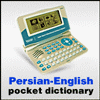 People power, not American
power People power, not American
power
National referendum will set
in motion peaceful transition
to democracy
Pirouz Azadi
April 25, 2005
iranian.com
Dear Mr. Bamdad,
Whereas I do in principle agree with
the major message of your letter "Regime
change", namely the need
for change in Iran, I can not condone
your bitter tone and making so many allegations without
proof to substantiate them. It perplexes one not to conclude that
this is not an orchestrated MEK campaign.
There is only one fundamental
piece of truth, based on our collective impression, and not necessarily
based on sound mathematical sampling of Iranians
in Diaspora: the overwhelming majority
are for fundamental change in Iran obtained through a peaceful,
independent process. This wish is completing the same aspirations
by the 70
millions inside the country.
Now that the U.S. has unilaterally
occupied Iraq primarily for oil, leading to the deaths of hundreds
of thousands and misery for civilians in the name of democracy,
the best way fundamental change could spontaneously come
about in Iran is for the US to be capable of delivering on
its promise to establish an independent, democratic country
in Iraq.
Perhaps, the leadership of Iranian.com, reaffirming their
commitment to their won motto of "Nothing is sacred" would come
to their senses and publish the following article in the dire hope
that it could a bit elevate the level of debate from the pseudo-intellectual
cesspool you have created: You are entitled to your opinion, but
if such diuretic expression is the basis to defame others, it would
not only advance your otherwise point but more importantly it would
delay the whole process, in which case both the US and the Mullahs
would continue benefiting from it.
IRAN: The next paradigm of the Middle East
The Map of the Middle East with IRAN in
its center here Iran is once again preparing to hold a presidential
election in June 2005. The populace has participated in several
recent presidential, parliamentary and municipal elections with
a massive turnout seeking fundamental reform. After this did not
materialize, voter turnout plummeted at the parliamentary election
last year; this in turn led to a far right conservative majority
parliament. The public, disillusioned with lack of any substantive
reform, feels marginalized, ostracized, disenfranchised, disillusioned
and frustrated. People have concluded that these elections are
simply "make believe" in nature and not substantive.
Every indication shows an extremely low turnout is anticipated
for the June election. That does not mean that the establishment,
a parallel over-shadow government run by the Supreme Guardian
Ali Khamenei, will resort to the old tactic of stuffing ballot
boxes
by "millions" of fabricated votes. The claim will
once again be made that people with a yearning for martyrdom
will reaffirm their commitment to the Islamic Republic and
its new president, a strategy that was used but failed in the
Soviet Union, Egypt or Saddam's Iraq.
Regardless of the outcome of the Iranian
presidential vote, the new government
will inherit lingering problems, from violation of human rights
and
suppression of ideas and freedom, to stagnant economic outlook,
corruption and waste of resources, nepotism and cronyism, unemployment,
inflation, a brain drain and...
One of the likely leading candidates
for the presidency is Ali
Akbar Hashemi Rafsanjani, who is pre-certified by the sole decision-maker
of
the country,
Ali Khamenei. Rafsanjani
served a somewhat ineffective two-term presidency before. He
remains more known for his rhetoric than substance, and practically
the only contender for this, by and large, ceremonial office.
The irony is that he barely ranked 31st in a 30-seat parliamentary
election for Tehran at the previous national elections, and all
efforts failed to push him up to 30th rank in the slate. Instead,
Khamenei appointed Rafsanjani as head of the watch-dog Expediency
Council. No wonder the clergy, and the extensive shadow
organizational
network
they have
set up, have lost all stature among the masses since they
took over in 1979; they are viewed with increasing cynicism and
skepticism, if not ridicule. For instance, the Rafsanjani family's
vast businesse network of has made them among the world's
richest, having risen from nothing to billions of dollars in just
25 years.
Notwithstanding the lack of proof of any direct terrorist role
assumed by Iranians in Europe or in the U.S., the spiritual support
or participation of the Iranian Government or its surrogates in
the training and operation of terrorist organizations against Western
interests cannot be refuted. On September 11, that unprecedented
despicable act against the U.S. by non-Iranian nationals, has impelled
the U.S. to set a new foreign policy, the ramifications of which
will reverberate for decades to follow, especially in the Middle
East, including Iran.
 Through a doctrine of unilateral pre-emptive
or preventive strikes against anyone, anywhere, who is deemed to
have the possible potential to act in an adversarial position against
it, the U.S. is staunchly determined to strike against any real,
perceived, or potential target that may undermine its national
or international interests. The Afghanistan and Iraqi invasions
typify such a move. Through a doctrine of unilateral pre-emptive
or preventive strikes against anyone, anywhere, who is deemed to
have the possible potential to act in an adversarial position against
it, the U.S. is staunchly determined to strike against any real,
perceived, or potential target that may undermine its national
or international interests. The Afghanistan and Iraqi invasions
typify such a move.
The fact that the U.S. still has not been capable
of tracking down the al-Qaeda leadership in the Afghanistan-Pakistan
corridor or elsewhere, or has not found any evidence of weapons
of mass destruction in Iraq (the pretext to occupy that country),
is no longer an issue. The precedent of military occupation and
socio-economic hegemony under the banner of democracy and freedom
is now accepted, perhaps reluctantly, worldwide. Every country in
the Middle East, Central and South Asia, is under U.S. military
or
eco-political influence, except Iran.
Paradoxically,
evidence supports the argument that terrorism continues to propagate
itself, as long as the U.S. does not equitably address the deep
root causes of regional conflicts, especially the Israeli-Palestinian
impasse. The American, European, and South Asian allies are more
interested in retaining economic benefits. In fact, the true principle
of idealism, as it applies to equal treatment, justice, freedom
and democracy for all nations, has taken a back seat for a long
time. There are many in the global community who still hear the
term, "Crusade" used by President Bush in one of his
early speeches, as the driving force behind U.S. military expansion.
The new world order has certainly given a short-term competitive
advantage to the U.S. However, for the U.S. to remain a viable
competitive superpower accepted by other nations, it must include
in its foreign policy the pillars of its Constitution, namely,
freedom, justice, equity and equality for all. A delicate balance
must be sought to ensure that the people in Iran, despite their
government's anti-Western rhetoric, and other nations, develop
mutual respect, understanding and appreciation for the principles
that America stands for. Let us bear in mind that the Iranian people
spontaneously held a candle vigil in honor of those Americans who
fell on September 11, against their government's orders.
If elections since the overthrow of the 2500-year-old
monarchy in 1979 are any indication, Iranians expects
little improvement, if certain fundamental changes do not
occur. This may undermine the legitimacy of the current system,
but if pursued peacefully, it would safeguard the integrity of
Iran and the aspirations of her people. Iran has a very long tradition
of tolerance and culture that spans millennia. A Constitutional
monarchy was established in 1906. One should not view Iran with
its continuous historical presence in the region, in the same way
as its neighbors who were carved out of the Ottoman Empire by the
British and the French as late as the 1960's.
It is true
that the theological establishment in Iran considers the loss
of power as a threat to its existence as a ruling class.
Nonetheless, the idea of an all out referendum to seek substantive
input from the seventy million Iranians (plus the three million
patriots abroad), might serve as a last resort to avoid civil war,
a chaotic bloody revolution as in 1979, or external military confrontation
with the United States.
If the voices of the Iranian peoples were
really heard and they were empowered in a democratic federal
system, there might be a peaceful passage to modernity that would
preserve
the noble aspirations of the diverse Iranian culture, including
a reformed religion. This might facilitate Islamic Protestantism
based on separation of the Mosque and a democratic State, a model
for the rest of the Islamic world to emulate. The alternative
is too costly, not only for the country as a whole, but also for
the
clergy and their cronies entrenched in the layers of shadow government
that can only lead to self-destruction and political annihilation.
A national referendum, overseen by international observers, to
determine the form of the constitution and government that the
majority of the people yearn for, is the only possible solution
for the current impasse. Otherwise, to borrow a contemporary
expression "all hell might break loose." The heated
discussion of referendum, as spread out in every segment of the
society and evidenced by close to fifty thousands who have thus
far signed a petition online advocating it, can not any longer
be neglected by the powerhouses in Iran.
 A referendum will set
in motion an independent, home-grown and peaceful transition
toward the institutionalization of the rule of law, order, security
and
development for all Iranian nationals, anchored on democracy.
Regardless of the outcome, there is merit and the need to investigate
a long
list of human rights violations, mass executions and torture
of political prisoners of conscience, and mysterious disappearances
and improprieties, through tribunals verified by international
organizations.
Just as the rest of the Islamic world, the Iranian populace may
conclude that a superior class of clergy is no longer needed for
its society to remain ethical, healthy and progressive. A referendum will set
in motion an independent, home-grown and peaceful transition
toward the institutionalization of the rule of law, order, security
and
development for all Iranian nationals, anchored on democracy.
Regardless of the outcome, there is merit and the need to investigate
a long
list of human rights violations, mass executions and torture
of political prisoners of conscience, and mysterious disappearances
and improprieties, through tribunals verified by international
organizations.
Just as the rest of the Islamic world, the Iranian populace may
conclude that a superior class of clergy is no longer needed for
its society to remain ethical, healthy and progressive.
The three
million Iranians in Diaspora, including the one million in the
US alone, who are deemed among the most affluent and most educated,
will undoubtedly play a crucial role in the realization of this
dream for their ancestral homeland through trade and intellectual
interchange.
|